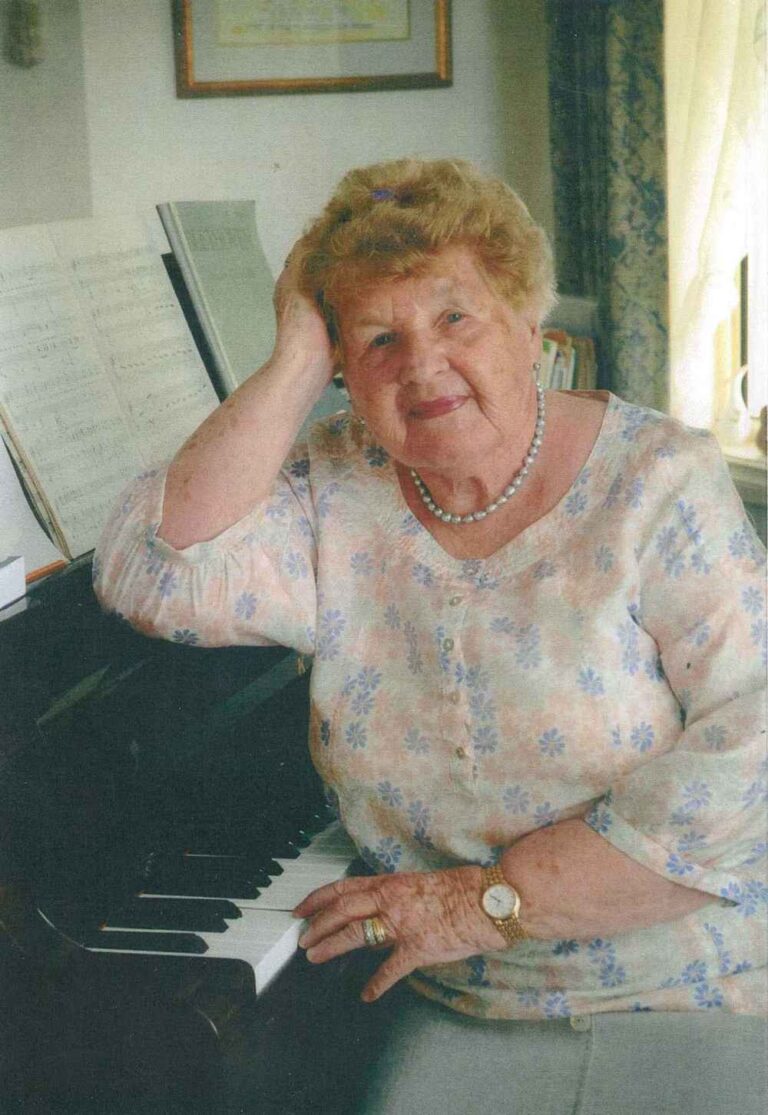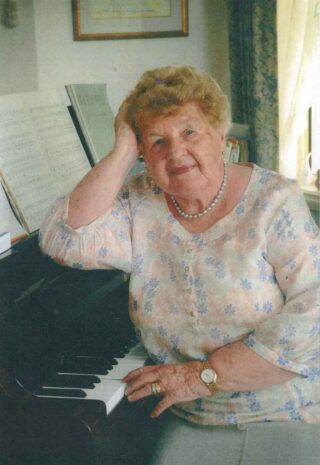- Entry type: Person
- Entry ID: AWE6617
Hall, Judy
- OAM
- Birth name Baillie, Evelyn Margaret Mary

- Born 2 July 1922, Trafalgar, Victoria, Australia
- Occupation Music teacher, Musician
Summary
Judy Hall (nee Baillie) was born into a musical family in West Gippsland in 1922. Although she did not begin formal piano training until she was twelve, she has been an inspiring and influential piano teacher for over seventy years. Her focus and expertise has been on the foundations of good technique and she has been an authoritative voice in music education across Australia. Her teaching and commitment to music education has been recognised through a number of awards and honours including an OAM in 1996.
Details
Evelyn Margaret Mary ‘Judy’ Hall (nee Baillie) was born in Trafalgar in 2 July 1922, one of four children to Irish born blacksmith Daniel Baillie and his wife Mary Larsen.
Judy Hall grew up in a family where music was important and she credits her early musical influences to her father, who was a band master and played in the Melbourne Codes Brass Band and the State Theatre. Her musical education was further expanded with the family’s purchase of a radio in the 1930s, which provided entrée to broadcast concerts, affording an introduction and education in classical music.
Judy Hall was educated at the Trafalgar State School and Warragul High School. As a child, Judy had access to her father’s piano, teaching herself the rudiments through playing by ear and supplemented by informal lessons provided by her father, who taught her the basics of music, although it was not until she was twelve that she started formal music lessons. At the age of fifteen, she left the Warragul High School and continued her education at St Joseph’s Convent in Trafalgar, where her studies included bookkeeping, typing and music.
Whilst still in primary school her skills as a pianist were recognised, and she was awarded a scholarship by a local piano teacher, Miss Truebridge, which granted her six months tuition. Her piano lessons with several local teachers were of a variable nature, most of whom she did not consider accomplished in music or education. As a pianist, with only two years of formal tuition, she started accompanying her classmates in concerts, whilst also winning a number of local eisteddfods. At one such eisteddfod her musical mind was opened by another competitor’s renditions of Bach’s instrumental Arioso. Suddenly she comprehended that music could be interpreted, rather than just played as a series of notes. This was an insight which provided her with the awareness that her technique was lacking and required improvement. So, she set out to find a teacher who could assist her in improving this. A previous teacher Margaret Smallacombe, had been taught by Edward Goll (1884-1949) a Czech born concert pianist and music teacher who was appointed to the Albert Street Conservatorium in 1914, the following year accepting a position at the Melbourne Conservatorium as piano soloist and chief study teacher of pianoforte, shortly after being appointed as musical director at the Presbyterian Ladies’ College. So from c.1938 utilising whatever means she could to journey to Melbourne, Judy Hall began the arduous trip of travelling to weekly half day private classes with Goll. In recalling her childhood musical training prior to Edward Goll, she believes she learned how to play without any musical understanding, commenting ‘no one could have had a worse start’.
As a twelve-year-old girl guide, Judy Baillie had met a ‘good looking’ boy scout, Cedric James Hall, and in 1944 after ten years of friendship, they were married. At the end of World War Two, as a young mother with a new baby, Judy Hall embarked on her career as a music teacher, eventually having another two children whilst developing a reputation for the excellence of her teaching. She has noted that without their support she would not have been able to achieve all she subsequently did.
Understanding the deficiencies in her own musical education, she wanted to ensure that her pupils had a better start. Actively involved in the Victorian Music Teachers Association (VMTA), which provided both support and professional networks, she participated in many of the training sessions the Association delivered for music teachers across the state, as well as attending the Summer Schools they offered. Here she was exposed to a number of international music teaching theorists. She also undertook three overseas trips with the Association, whose itineraries included visits to music schools, universities, concerts and talks, inspiring the participants in their teaching and practice.
In the late 1970s, Warren Thompson, music teacher and founder of the Federation of Australian Music Teachers’ Association, brought to Australia the Italian music educator Lidia Baldecchi-Arcui, who was to become Judy Hall’s mentor. At their first meeting in Sydney, Baldecchi-Arcui lectured for five days on the importance of the foundations of music education. This was a moment of clarity for Judy Hall, whose own introduction to piano had been so mediocre. It led to a dozen further visits to Australia by Baldecchi-Arcui and several reciprocal trips to Genova by Judy Hall, both accompanying her gifted students and independently. Baldecchi-Arcui’s influence saw Judy Hall develop her own teaching notes, stressing the importance of hand technique for beginner pianists. Entitled The First Three Years, these covered the basic techniques required-relaxation exercises, hand position, anchoring of thumbs, finger position, and the strength required in every element of fingers, wrists and hands for effortless piano playing. This became the foundation of Judy Hall’s focus on the formative development of pianists, an expertise she has shared as a guest lecturer at the Sydney, Adelaide and Perth Conservatoria, training music teachers across the nation.
Within her local area of West Gippsland, Judy Hall used her networks and connections to facilitate and organise touring musicians, as well as local concerts for the Country Women’s Association, football clubs, fire brigades, and with a group called ‘Judy and Friends’ she gave concerts for community organisations including nursing homes, and for private recitals. Her students competed regularly in eisteddfods, winning seventy-six major prizes and scholarships. In expanding their musical repertoire, she championed the inclusion of the concerto in these competitions accompanying most of them herself on 2nd piano.
The scores of students she has taught have included over thirty-two A.Mus.A Diplomas, and 4 Licentiate Diplomas; thirty are now music teachers scattered all over Victoria. Amongst her former students are a number who established medical and science careers, while continuing to maintain their musical practice. While her high-profile students have included Dr Pamela Burnard, Professor of Arts, Creativities and Educations at the University of Cambridge, the pianist Tim Young the Head of Piano and Chamber Music at the Australian National Academy of Music (ANAM) and a founding member of chamber group Ensemble Liaison, and a pianist with leading Australian and international musicians and ensembles. Dr Paul Rickard-Ford a Senior Lecturer in Music at the Sydney Conservatorium, musician and Federal Examiner for the AMEB. The conductors Vanessa Scammell and Paul Fitzsimon, and the rising star pianist Alex Waite.
At the age of sixty, Judy Hall decided to augment her musical repertoire, undertaking cello lessons in order to play in Chamber Music groups. As a cellist she has accompanied the La Trobe Valley Operatic Society, and played with local orchestras. At the same time, she also commenced painting classes, first in oils and later in watercolour.
From her late seventies, Judy Hall has starred in a number of concerts. The first in 1996 was at the La Trobe Regional Gallery, where she played Beethoven’s Piano Concerto no 3 accompanied by the Latrobe Orchestra. Her ninetieth birthday was celebrated with a four-and-a-half-hour concert, with musicians including former students, friends and family. The highlights of her concert career began in 2018 at the age of ninety-six, with Judy Hall as soloist with the Gippsland Symphony Orchestra playing Chopin at a series of concerts in Warragul and Sale. Prior to the first event, Judy Hall spoke to the Secretary of the VMTA asking if the concert could be recorded. Hearing this, the ABC offered to do so, and when interviewed by the broadcaster, she mentioned that her ambition had always been to play at the Melbourne Town Hall. This was followed up by the Melbourne City Council, and later the same year with the Latrobe Orchestra she fulfilled her dream, playing in the Melbourne Town Hall, to a packed audience of former students and their families.
In February 2019, for the Gala Concert to celebrate the tenth anniversary of the Melbourne Recital Hall, Judy Hall, now in her ninety-seventh year was asked to play a duet with Tim Young, also accompanied by Alex Waite, playing Liszt’s Hungarian Rhapsody no 2 in G Minor.
Judy Hall’s contribution to music education has been recognised through a number of awards and honours:
- An OAM received in 1996, for her contribution of fifty years to music education,
- the Distinguished Teachers Award from the Victorian Music Teachers Association in 2011,
- Life Membership of the Victorian Music Teachers Association 2019,
- Life Membership of the Latrobe Valley Orchestra,
- Life Membership of the Latrobe Valley Eisteddfod.
